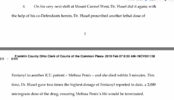I've read a number of the comments on the Husel trial, and frankly I'm surprised at the inaccuracies and misinformation in many of them. Please read my recent Medscape article on the Husel matter and the patient safety issues at Mount Carmel that it raised. There is clear evidence that Husel was the only physician outside the ED prescribing these large doses on Fentanyl, in one large dose. It's clear that his dosing practices for palliative withdrawal were far outside standard medical practice. Most of his patients who died had no evidence of opioid tolerance (and actually there were 35, not just the 14 cited in the murder charges). It's clear that his patients died within minutes of being administered these doses of Fentanyl combined with other opioids. Under Ohio state law, peer review records are only deemed confidential in civil actions, not in criminal actions, so it's legally questionable why it's not permissible for the medical witnesses to testify about the Mount Carmel investigative findings that Husel was the only doctor on staff outside the ED who ordered these large Fentanyl doses. That's a key piece of information for the jury to consider. There's no evidence that many of these patients were feeling pain. There are questions about whether some of these patients might have survived palliative extubation if they hadn't been administered these large Fentanyl and other opioid doses. If some of the commenters believe involuntary euthanasia should be legalized, they should say so explicitly. But euthanasia is illegal in the United States.
Speaking for myself, (though I presume many others here);
We tend not to pay too close attention to the typical article for public consumption written by journalists as they more often than not are full of attention grabbing quotes and viewpoints from lawyers, hospital officials, and laymen but light on clinically accurate information or context. In short, we are often surprised by the inaccuracies in the reporting.
Your article is better than most however. But let’s take this passage;
“Mollette, who had diabetes, previously had been hospitalized for treatment of a gangrenous foot. When he arrived in the ICU, he was suffering from
acute renal failure and low blood pressure, and had had two heart stoppages, according to a 2020 Ohio Board of Pharmacy report. He was placed under the care of William Husel, DO, the sole physician on duty in the ICU during the overnight shift.
Around 9 PM, Husel discussed Mollette’s “grim prognosis” with family members at the patient’s bedside. He advised them that Mollette had “minutes to live” and asked, “How would you want him to take his last breath: on the ventilator or without these machines?”
In less than an hour, Mollette was dead. Some said that what happened in his case was similar to what happened with 34 other ICU patients at Mount Carmel West and Mount Carmel St. Ann’s in Westerville, Ohio, from 2014 through 2018 — all under Husel’s care.”
So this is a pt who came in presumably in septic shock complicated by two cardiac arrests. Presumably he was on pressor(s) for blood pressure support and likely had profound metabolic disturbances. But we don’t know much else about his pre-existing history other than he was diabetic. These things matter and provide context.
Now, I’m absolutely not saying that just from reading the information you provide that my decision would be to make this patient comfort care and terminally extubate shortly upon arrival to the ICU. Many many patients nationwide arrive to the ICU in septic shock on multiple pressors and though hospital mortality is high in these patients it’s certainly not standard to consider them a lost cause the night of arrival.
But then as you proceed in the story an abbreviated conversation is had with family at 9pm (when did the patient arrive to the ICU?), and then “in less than an hour” the patient was dead. Again context matters. Was the fentanyl given, pt extubated, then died an hour later? Or did it take 50minutes to get the fentanyl and ready the family at which point the pt was given fentanyl, extubated, never took another breath, and arrested 3-5minutes later? Context.
With all of that said, if even most of what you report is accurate, he was not only practicing widely outside of standard of care, he was doing much worse. If they have even one instance where 500+ mcgs of fentanyl was given and the patient time of death was called inside of 10min of that dose, he euthanized a pt. Especially if some of these patients hadn’t received any pain medication during that hospitalization. If he was regularly having rushed goals of care discussions with families literally an hour upon arrival to the ICU and making patients comfort care/terminally extubating patients his first night meeting them, this is a gross deviation from expected compassionate communication. If he was regularly giving verbal orders for high dose fentanyl to avoid or bypass pharmacy oversight, again that’s a deviation that speaks to a recognition that he was doing something he knew would be questioned.
I think many of us come into these things with biases secondary to previously read sensationalized reporting aimed at laymen compounded by the desire to believe a colleague had clinical reasons to do what they are charged with. I still hope this is the case, but again, if it’s as you have reported, without significant clinical context missing, he is guilty of hastening death at the least.
P.S. I still maintain, that my fear in this is hospital enforced limits on comfort care medications, which you report the hospital did reduce to 25-50mcg of fentanyl at a time, and the resulting under dosing of susceptible patients in their final moments. Which is a tragedy.




